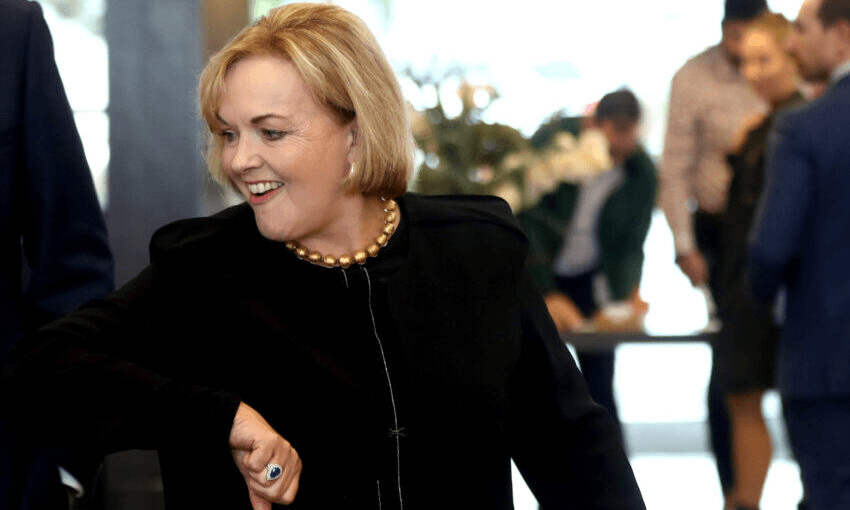Do not mistake tough for malevolent. The new National leader can take on whatever role is required of her politically and play it to perfection, writes Ben Thomas.
The National Party faces the fight of its life. And so it has chosen as its new leader the toughest fighter in New Zealand politics.
Collins’ rise in some ways reflects the ascension of Jacinda Ardern. As inexplicable as it seems now, Ardern was only handed the leadership as a last resort after Labour had exhausted an identikit succession of grey, middle-aged men, despite her high public profile and obvious appeal.
Similarly, it has taken the greatest leadership crisis in National’s modern history for the party’s MPs to reluctantly, eventually, land on their consistently best performer over a decade to lead them into the election.
After Simon Bridges signaled he would not seek the leadership last night, the die was cast for Collins. After the failure of the near-anonymous Muller under the glare of national pressure, National could only choose a leader that they could use “straight out of the box”.
While former defence minister Mark Mitchell’s name emerged as a potential contender, another untested performer unknown to the public would have been too much to ask of the caucus’s frayed nerves and the electorate’s patience.
Labour will want to take note of the comparison, as distasteful as its MPs may find it. Just as National MPs have consistently under-rated Ardern, seeing her as a naif out of her depth despite the obvious proof to the contrary, Labour tends to take a one-dimensional view of Collins that is not widely shared by the electorate.
The parliamentary left see Collins’ toughness as malevolence. It is easy to write Collins off as the Crusher caricature, a law-and-order hardliner. But Collins is chameleonic – able to take on whatever role is required of her politically and play it to perfection, switching through her emotional range at will.
In opposition she hounded education minister David Benson Pope out of parliament with a campaign of political pressure – and then later appeared in a women’s magazine in a well-received sympathetic story with her family talking about the toll the bearpit of politics took on her. In the social development portfolio she led John Key’s softened pitch of caring for the “underclass”.
In government, she reveled in her law and order persona, and capably handled every portfolio. She inspired intense loyalty from her staff, and was widely regarded as one of the best bosses in the Beehive alongside Key. If your test is, it doesn’t matter whether someone is nice to the Labour Party, it matters if they are nice to the waiter, then Judith Collins is a very nice person.
Collins is the only National MP capable of footing it one on one with Ardern. She is a proven and polished media performer. This solves a conundrum for National that dares barely speak its name. Since Bill English, National leaders have been unable to properly calibrate the tone of their opposition to Ardern, veering between discordant patrician sexism, and the awkwardness of a dog trying to operate heavy machinery.
Both sides of Collins are the real Collins. Her ferocity and Ardern’s kindness are not opposites, but rather flipsides. When a hospitality worker went public over then prime minister John Key’s ponytail-pulling, other National MPs, including the then minister of women’s affairs Louise Upston shamefully repeated a line that it was mere “horseplay”.
Collins, from the backbench, called her own prime minister’s actions to account, lecturing him publicly on his judgment. In a follow up interview she said that in her own waitressing days she had “poured coffee down someone’s lap when I’ve felt they needed to be controlled a little bit better”.
She has baggage – her association with blogger Cameron Slater is a career lowpoint. Nonetheless, she is the only senior figure from Nicky Hager’s Dirty Politics book who was both investigated (over an email that surfaced afterwards, where bloggers suggested she had been involved in forcing out the director of the SFO) and then subsequently cleared. She resigned as a minister while the inquiry proceeded and was stripped of her “Hon” title by John Key, a grievance that clearly still rankles according to her newly released autobiography.
But her own personal qualities aside, can she win? The election is very much the Labour’s to lose: Ardern has licence to govern over a health and economic crisis until election day, and a $20 billion war chest. Reports that Labour will not announce “policy” this election are true enough but trivial – as government they will announce billions in infrastructure, wage subsidies and targeted industry support. They will get to decide the timing of travel bubbles.
First she must unite the party. Collins appeared with her whole caucus (absent Muller) in a show of togetherness. Her very election suggests her detractors in caucus have swallowed their pride for a desperate bid at victory. Gerry Brownlee, her deputy, is well liked and steady, and has stepped in as 2iC in similarly unfortunate circumstances before in 2004 when Nick Smith buckled.
Before beginning a wide ranging question and answer session with gallery reporters late last night, Collins’ stump speech after emerging from the caucus room was essentially one word: economy.
It was repeated like a mantra, and signals that National accepts the battle over the health response is lost (for now, at least, and touch wood, unless there is a second wave of the virus). Now all attention will turn to mounting unemployment, and sectors and businesses crying out for more help.
National cannot force mistakes by the government or precipitate a crisis. All it can ensure is that it looks like a credible government in waiting after weeks of unrest. And that when New Zealanders reach for help, the velvet gloved, iron fist of Judith Collins is reaching back.

